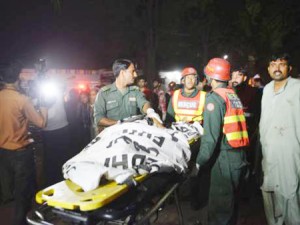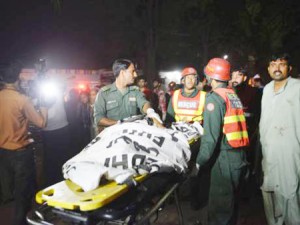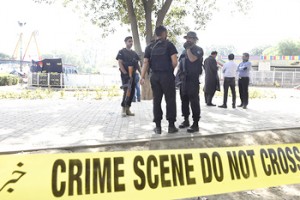The Guardian
Bina Shah
 A week ago, on Palm Sunday, scores of Pakistani Catholics were lined up in front of a metal detector, waiting to enter St Anthony’s, a small Catholic church, 900 metres from Karachi’s Cantonment train station. Across the road, vendors sold religious paraphernalia — crucifixes, prints of Jesus and the Virgin Mary, red and gold-spangled cloth to decorate shrines, garish reproductions of Da Vinci’s Last Supper.
A week ago, on Palm Sunday, scores of Pakistani Catholics were lined up in front of a metal detector, waiting to enter St Anthony’s, a small Catholic church, 900 metres from Karachi’s Cantonment train station. Across the road, vendors sold religious paraphernalia — crucifixes, prints of Jesus and the Virgin Mary, red and gold-spangled cloth to decorate shrines, garish reproductions of Da Vinci’s Last Supper.
A lone guard stood at the door, waving people through and a volunteer scout directed the traffic. The scene illustrates how vulnerable this particular minority is to the rage of Pakistan’s religious extremists, who have been trying their hardest to destroy the diversity that is so important to Pakistan’s slowly-growing awareness of pluralism and tolerance.
Religious minorities are an indelible part of the fabric of Pakistani society; they are represented by the white stripe on the Pakistani flag. This is echoed in the words of founding father Mohammad Ali Jinnah’s most famous speech: “You are free; you are free to go to your temples. You are free to go to your mosques or to any other places of worship in this State of Pakistan. You may belong to any religion, caste or creed — that has nothing to do with the business of the state.”
While Jinnah’s message of secularism never caught on in Pakistan, religious coexistence has always had a well-defined place in the Pakistani way of life. The horrific suicide bombing in Lahore on Easter Sunday once again reminded us of the vulnerability of Pakistan’s Christians, and of the fragility of coexistence.
A suicide bomber stood next to the children’s rides in Gulshan-e-Iqbal Park and blew himself up, killing at last count 70 people and injuring 300, many of them Christians, most of them women and children.
The group that claimed responsibility for the bombing, the Jamaat-ul-Ahrar, is a splinter group of the Pakistani Taliban. Last year, they had killed 15 and injured 70 in an attack on two Catholic churches in a predominantly Christian neighbourhood in Lahore.
The sights and sounds in the immediate aftermath of the attack were staggering, even though, sadly, these apocalyptic scenes are now becoming familiar global images — in Ankara, Brussels and Iskandariya recently.
Women holding each other and wailing in shock, the blood of dead children staining their parents’ clothes, a young man with an open head-wound running into the hospital carrying a wounded child in his arms.
The Jamaat-ul-Ahrar soon issued a statement: Their target had been Christians celebrating Easter, although they said they never intended to hurt women or children, only Christian males. Their words belied the indiscriminate cruelty of their attack. They also reflect the fact that the Pakistani Taliban has been weakened by the continued military operation against them in the tribal belt and in Karachi. They have now splintered into smaller groups, acting not as a cohesive unit, but as lone-wolves and renegades that hit soft targets like schools and parks because they can no longer reach military targets or security installations.
But extremists are not representative of all Pakistanis. One thing to understand about Pakistan is that most of its people are socially conservative Muslims, but only a minority actually advocates and enacts violence. The majority of Pakistanis are peaceful and would not act violently towards religious minorities, even if they do not share their religious beliefs. Indeed, in times like these, Pakistanis forget about who is a Christian or a Muslim, and only think about helping the injured.
As word of the bombing spread through television and social media, people in the immediate vicinity rushed to take the wounded to hospital in their cars, taxis and rickshaws before ambulances reached the scene. Pakistan’s answer to Uber, a car service called Careem, offered free rides to anyone wanting to donate blood at the hospital. One of the most widely-tweeted images was of a young doctor on call with a cannula in his arm; he was donating blood in between treating patients. People from as far away as Karachi stood ready to donate food and water to afflicted families.
Religious extremists will never succeed in taking over Pakistan, even if they maintain deadly effectiveness in spreading the virus of terrorism all over the world.
As with any epidemic, the weakest are always the ones to fall first. Yet, humanity is the one thing that inoculates us against its reach. As long as we have our humanity, we will still remain united as Pakistanis, no matter who we choose to call our God.




